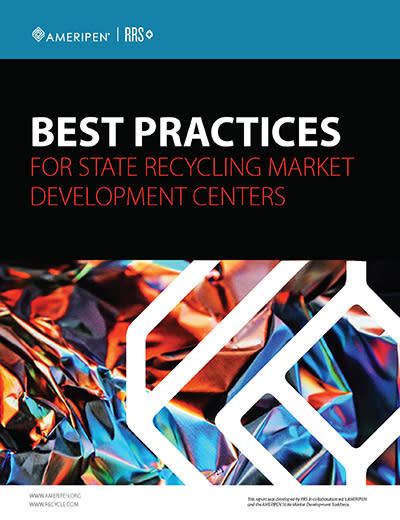
Best Practices for State Recycling Market Development Centers
In the public discourse, we often speak of recycling as an environmental practice but that perspective, while true, fails to account for the significant role recycling provides for manufacturing industries. In using recycled materials, we reduce raw material use, we drive reduced impact of products, and we create jobs and opportunities. Recycling market development programs are at the core of these activities. Demand for our recycled materials exceeds available supply in many cases. We believe supporting and advancing market development programs is a key means through which business and government can work together for the mutual environmental and economic gain of all our communities. With this document, it is our hope that we can help encourage more investment into market development and to provide states or regions looking to advance, or expand programs, with a guide towards best practices and necessary considerations.
What is a recycling market development center and why are they important?
A state recycling market development center is an agency-led or third-party-led entity or program typically established and funded by state governments focused on facilitating growth within the recycling industry through market development activities, including:
- Supporting businesses that use recycled materials or are part of the supply chain,
- Bringing together actors and resources that facilitate collaboration and partnership,
- Identifying and overcoming technical, logistical, and economic barriers that are inhibiting growth of recycling markets,
- Providing expertise and decision support tools to drive and coordinate strategies throughout the system, and,
- Working to achieve positive environmental and economic outcomes.
Recycling market development had a first wave of momentum in the early 1990s. This included a federal strategy initiated by the EPA called “Recycling Means Business”- focused on creating jobs through support of recycling businesses. Some of the earliest state-led recycling market development programs were established during this period including programs in North and South Carolina, Minnesota, New York, and Washington.
Following a period of decline, as export markets rapidly developed, domestic recycling market development is again a growing area of interest within federal and state legislatures. Agencies who recognize that the recycling industry can be an effective economic development engine with triple bottom line benefits. With more mature recycling programs nationwide, technological advancement in sorting, processing and conversion, expanded focus on domestic recycling end markets, and strengthening voluntary and mandatory requirements for utilizing recycled content, the conditions are more favorable than ever to support recycling market development.
State governments are just one of the many actors driving recycling market development activities. Many stakeholders across the industry and within local governments and NGOs are essential driving forces behind this growing industry. This guide is intended as a tool to assist state governments and related stakeholders interested in establishing or improving recycling market development centers. It is based on several years of research into existing successful market development centers1 and programs around the country. This guide outlines best practices and decision points to consider when embarking on that task.
It is important to note that there is no one-size-fits-all. Every state and region have unique conditions that may lead to a different approach. This guide recognizes that and provides a variety of options for consideration depending on the local context.
There are four primary topics of focus when considering developing (or updating) a state recycling market development center:
- Establishment: The formal framework and directive of the Center, often established in statute.
- Funding: The source of funding for operating the Center and implementing programming.
- Operations: The structure of the Center itself and how it is directed, staffed, and governed.
- Programming: The tools and resources that the Center utilizes to fulfill its mission.

